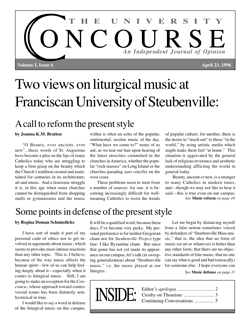Core curriculum (4)
by Regis Martin
For what it’s worth, I count myself among those on the faculty pressing for fundamental structural reform in the core curriculum at Franciscan University. Are we a minority? I do not know. What difference does it make? As Paul Claudel (I think it was) said to his young friend Jacques Riviere, in part to remedy the latter’s distress of mind over the few actual Christians in the universe—What has truth got to do with numbers?
The truth of the matter, as I see it, is that far too many of our students graduate from this University without having experienced a liberal education. By that I mean what the critic Mark Van Doren meant in his book Liberal Education, namely, “those things we are not at liberty to omit”—like theology, philosophy, history, literature, music, art and science. Matthew Arnold’s idea of the best that men have thought and felt from the beginning seems to me not a bad place to begin. In other words, those disciplines which determine at the deepest level what it means to be a human being; pursuits which enable the mind and heart of the student to be most completely free; free from the oppressions of ignorance, free to become, as Dante said of Aristotle, “the master of those who know.”
Are we educating our students in that way? I doubt it. Ask any graduate what books he or she remembers, what authors decisively shaped his or her mind or soul or sensibility, and not one in fifty will have a clue as to the immense patrimony of literature which, alas, they were never required to read. I know a young woman, devout and intelligent, who spends her evenings reading Willa Cather and Sigrid Undset because, despite four years of undergraduate education at this University, the only imaginative writer she’d ever heard of was Stephen King.
It is one thing to admit students who have not read Homer or Sophocles; but to graduate them without their having read them is indecent. Not to mention the whole Patristic and Medieval and Renaissance worlds. I dread to think the number of theology majors who have not read a line of Irenaeus or Augustine, Anselm or Aquinas. And what of Dante or Shakespeare, between whom all of literature can be divided? Or Pascal, that brooding genius of the French baroque? Or Tolstoy and Dostoevsky, those two towering figures of 19th century Russian literature? Or a host of modern writers from Newman to Eliot, from Chesterton to de Lubac, to John Paul II? And then there is the whole vibrant world of art and music, about which so many of our students know and experience nothing. To leave such luminous creations of the human spirit unseen, unread, and unfelt is an education unworthy of a Catholic university.
St. Augustine, in a sublime passage from the Confessions which the Pope quotes on the opening page of his Apostolic Constitution On Catholic Universities, reminds us that “the blessed life insists in the joy that comes from the truth, since this joy comes from You who are Truth.” If this is so then hadn’t we better get busy imparting to all our students that truth insofar as it may be found in the enduring monuments of human civilization?
“Everything good and everything beautiful belongs to us,” St. Justin Martyr writes. (Thus even pagans witness to the Word to the extent they speak and write truly!) Because the same Logos who illumines all things is the proper end of all men, we are obliged to pass on to our students all that is worth knowing about God and man and the world.
Under the circumstances, we simply cannot pretend that real education is happening here until all our students—however disparate their course work or vocational interests may be (and certainly it is proper that those differences persist and be respected)—undertake to experience genuine and sustained encounters with the intellectual and spiritual giants on whose shoulders we all gratefully stand.
Regis Martin, Associate Professor of Theology
Dr. Martin is currently on sabbatical.


